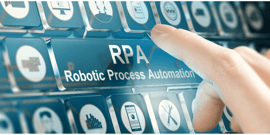BP3 GLOBAL-SERVICE
NCH's Robotics Journey with Robert Trego
Robert Trego highlights the good and bad of NCH's journey with Robotics and Robotic Process Automation, and how much time innovation really saved their employees.
Krista White: Thanks, Robert, for sitting down with me today.
Robert Trego: Appreciate it.
Krista White: In your talk at Driven that you just gave, you were talking about how NCH has actually freed people of their mundane jobs through automation. Can you give me a little synopsis about that?
Robert Trego: Well, about a year, year and a half ago, we started looking at how could we do things a little smarter, a little better? Our CIO had started an innovation initiative. At the time RPA was the really hot topic. So, we looked at how can we do things a little smarter? At that point in time we started looking at all the RPA vendors, and we ultimately chose automation anywhere. We thought they fit us better. As we started to go through it, well, there was a lot of buzz and interest. We started doing some presentations to generate some more interest by departments and divisions. Ultimately, we said, "Okay. We're getting away too many use cases." We said, "We'll take this down to our IT, and we'll start there. We spent about three to six months trying to understand the software and get a little bit smarter about how that works.
Robert Trego: Well, we weren't moving fast enough-
Krista White: Naturally.
Robert Trego: .. and eventually, the board started going, "Okay. Well, you're going to have to do something a little better than this." About that time we ran into a situation in Italy, where we had to get a lot of information from 4,000 customers in a two month timeframe. At the time they were going to do it manually, by hand, and it was going to take them somewhere in the neighborhood of three or four months. So, they were never going to meet their deadline to get this invoicing. We actually had one of our developers at the time write a bot in about a couple of hours, and it actually shortened that process to about a two day, three days of getting the information out. Then as soon as we got the information back in, we started reading that information. We had our first real success in getting a bot to do work that people were going to do and saving a lot of time.
Robert Trego: Not soon after that we were starting to get a process in our AR department, where we were trying to do credit releases, and it was taking a person about a half a day to go through the entire process. That was just the first half of it. The second half of it was they had to get approvals from managers. So, we built a bot, and it basically cut that time to about 15 minutes a day. From that standpoint, they were able to free that person's time up and actually focus them on collections and more cognitive type tasks.
Krista White: So, from half a day to 15 minutes.
Robert Trego: To 15 minutes.
Krista White: That's incredible.
Robert Trego: Then we took a second phase of that, which was always going to take a long time getting the approvals, and we shorten that process down, probably a little bit longer than that, but not much longer.
Krista White: When you talk to other people about getting started with RPA or getting started with automation in general, what do you suggest to them? How do you suggest they approach it? How do you suggest get to your success level?
Robert Trego: Oh, that's a good question. Well, one of the things I think we did, we didn't do really smart in our first time was we didn't involve a partner up front. We thought, "We can do this all by ourselves." We saw it Automation Anywhere's Imagine, and we had come here at driven, and we thought, "Well, We can do it all." Right? Well, we weren't quite as smart as we thought we were. Engaging a partner like BP3 had was really productive for us. We actually brought them in a little bit later and had them kind of evaluate are we doing this the right way? We actually had them build one of our bots to, at least do the front end work of it. So, that helped speed up that process and then kind of gave us a way to look and think differently than what we had done before.
Robert Trego: If they're getting started in their RPA journey, the first thing is I would say you keep on your journey, because it definitely does help you. You need to find the organization, whether it's UiPath or Automation Anywhere, whichever RPA software is best for you and fits you. Make that selection and then partner up with somebody. Then take it in small chunks. You don't have to boil the ocean.
Krista White: That's good advice for anything, honestly.
Robert Trego: Yeah. evidently.
Krista White: Well, thanks for sitting down.
Robert Trego: Oh, you bet.
Krista White: If you liked this video, can, you can catch Robert's talk from Driven on our channel and also more talks like this when you subscribe, when you subscribe, when you subscribe.


